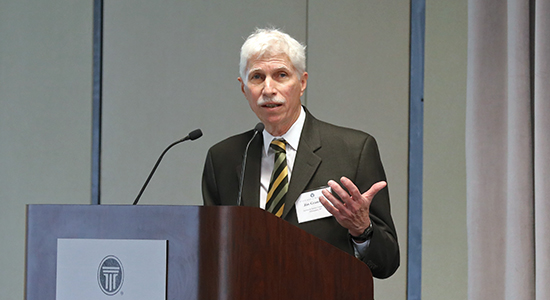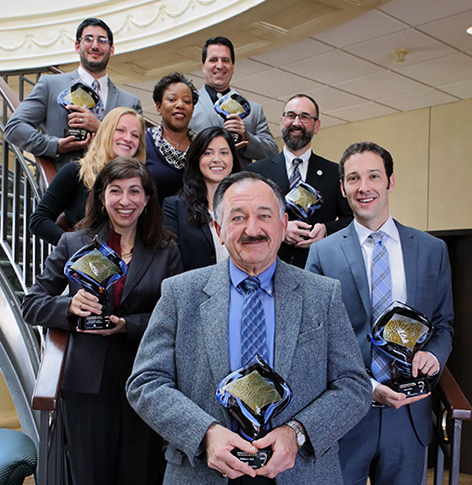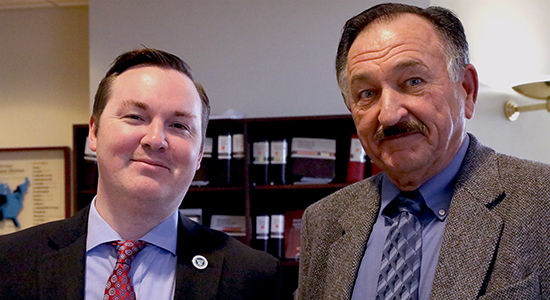
James Gramling Jr., president of the Wisconsin Access to Justice Commission, urged the State Bar of Wisconsin Board of Governors to support an increase in the pro hac vice fee assessed on out-of-state lawyers to help sustain funding for the commission moving forward.
Visit the State Bar’s Facebook page for more photos, or click here.
Dec. 1, 2017 – The fee for admission to practice law in Wisconsin pro hac vice would increase by $50 under a proposal that the State Bar of Wisconsin’s Board of Governors unanimously supported at today’s meeting at the State Bar Center in Madison.
The Wisconsin Access to Justice (ATJ) Commission recently petitioned the Wisconsin Supreme Court for an increase in the pro hac vice fee to support the commission's work towards expanding access to justice for unrepresented, low-income residents in Wisconsin.
Currently, the pro hac vice fee, assessed on out-of-state lawyers who petition to temporarily practice law in Wisconsin courts, is $250, distributed to the Office of Lawyer Regulation ($100), the Wisconsin Trust Account Foundation ($100), and the ATJ commission ($50).
Since its creation by the Wisconsin Supreme Court in 2009, at the State Bar’s request, the ATJ Commission’s work has successfully expanded access to justice in Wisconsin.
For instance, the ATJ Commission petitioned for rule changes that now allow CLE credit for pro bono work, which encourages and incentivizes more attorneys to do pro bono.
In addition, the commission successfully petitioned for a change to the state’s class action rules. Now, residual (cy pres) class action funds are distributed to the Wisconsin Trust Account Foundation, which administers interest on lawyer trust accounts to fund legal aid organizations in Wisconsin.
The commission also runs Free Legal Answers, a program that recruits volunteer attorneys to answer civil legal questions, for free, for eligible individuals through its website. Over the last couple of years, that service has served more than 1,000 people, according to ATJ Commission President James Gramling Jr., a former municipal court judge who has led the commission as president since his election in 2014.
“We’ve been involved in many initiatives that have had concrete results for low-income people across the state,” Gramling said.
Sustainable Funding Needed
The State Bar initially funded the ATJ Commission with $300,000 through an access to justice reserve fund. But Gramling says that funding is nearly depleted after nine years in operation.
The commission has operated on about $70,000 per year. In 2014, the Wisconsin Supreme Court granted the Office of Lawyer Regulation’s petition to raise the pro hac vice fee from $50 to $250, with $50 of the fee going to the commission. That fee resulted in about $30,000 per year to supplement initial State Bar funding.
Now that the initial State Bar funding is depleted, the State Bar has approved $20,000 per year in funding for the next five years, and its Family Law Section has provided $5,000 grants in each of the last two years, but additional funds are needed to fill a $20,000 deficit moving forward.
“We have a small budget, but we are running out of operational funds,” said Gramling, noting the majority of the commission’s budget funds staff time and the remainder funds the types of expenditures expected from of any credible nonprofit organization.
One of the challenges in obtaining continued funding, Gramling said, is that the ATJ Commission does not want to compete for funding with other legal service organizations. The ATJ’s Commission’s petition, 17-09, will now move forward with State Bar support.

The 2017 Wisconsin Legal Innovators were celebrated for their work to improve the profession at today's Board of Governors meeting in Madison. Read more about these movers and shakers in the November issue of Wisconsin Lawyer magazine. Pictured: Byll Hess, Cristina Bordé, Maria de Arteaga, Yvonne Geerts, Brian Potts, Hon. Valarie Hill, Hon. Phil Chavez, Nick DeSiato, and Seth Dizard. Not pictured: Hon. Derek Mosley.
Visit the State Bar’s Facebook page for more photos, or click here.
Legal Innovators Recognized
The board recognized the 2017 Wisconsin Legal Innovators, selected in the State Bar of Wisconsin’s fourth annual “That’s a Fine Idea: Legal Innovation Wisconsin” initiative.
The State Bar’s Communications Committee started the initiative to recognize innovation in Wisconsin’s legal community, from creative approaches to legal services delivery to entrepreneurial thinking, from product offerings to internal operations.
“Our profession is facing a lot of change,” said Tom Watson, a member of the Communications Committee. “There are a lot of disruptors to traditional delivery of legal services. We have to be prepared to deal with them, embrace them, and treat them as opportunities. The folks that you are going to meet this morning have done just that.”
William “Byll” Hess received the Lifetime Innovator Award. In the 1970s, Hess had one of the first cell phones, which he carried in a shoulder bag. His interest in technology carried through the decades and spilled over into the legal profession.
On the suggestion of then-State Bar President George Burnett, Hess helped create the State Bar’s Law Practice Assistance Program, Practice 411™.
“Most of my work on innovation was through bar committees and programs,” said Hess, who learned some technology lessons from a tech-savvy son who became a lawyer, as well as other people around him. “This award goes not just to me, but to all those who contributed innovative ideas.”
The board learned about Cristina Bordé, a clinical instructor at U.W. Law School who helped create the Wisconsin Latino Exoneration Program, an initiative of the Wisconsin Innocence Project at U.W. Law School. In her research, Bordé noticed that the number of Latino exonerees was low compared to the number of Latinos in prison.
Bordé helped secure a grant from the U.S. Department of Justice to create the program, which seeks to exonerate, through DNA evidence, Latinos who were wrongly convicted. The grant allowed Bordé to hire a full-time staff, including attorney Maria de Arteaga and intake specialist Yvonne Geerts, both of whom are bilingual.
“The purpose of our program is to reach out to Latinos who we see are underrepresented among exonerees,” Borde’ said. “We have begun to make a dent in this problem, a big problem in terms of the number of people who are wrongfully convicted who do not have the ability to represent themselves.”

New Law Practice Assistance Manager Christopher Shattuck with 2017 Wisconsin Lifetime Legal Innovator Bill Hess who helped to create the State Bar’s Law Office Management Assistance Program.
Visit the State Bar’s Facebook page for more photos, or click here.
Judge Hill said Milwaukee County was trying to fix a warrant problem with a safe surrender. The judges and staff took on the initiative to get it done.
“One of the things we figured out is that you have to meet people where they are, so we put it on Facebook and went viral,” Judge Hill joked. “A little conversation … has turned into what has become a wonderful program for the court and for the community.”
Instead of the city taking outright ownership of a property in disrepair – and the costs associated with that – Dizard acts as a court-appointed receiver and makes sure the property is maintained and rented out or sold to a reputable buyer.
DeSiato, assistant city attorney in Milwaukee, said Dizard, a private attorney at O'Neil, Cannon, Hollman, DeJong & Laing SC, has relationships that municipal government does not have. The collaboration solves a problem.
“It’s a very real collaboration, and we’ve done some productive work,” DiSiato said. “We have our goals set pretty high for the upcoming years.”
Potts, a partner at Perkins Coie LLP, said the idea came to him while typing on a firm computer that would not allow him to save hotkeys. Then he looked down and saw all these numbers, which seemed to benefit accountants but not litigators. “I thought, ‘why do I need all these numbers?'” he said. “ I’ll just create a keyboard for lawyers.”
The board heard various reports from chairs of the Governance, Policy, Audit, Finance, Diversity & Inclusion, and Strategic Planning committees, as well as legislative and court reports before adjourning for continued committee work. The board’s next meeting is Feb. 9, 2018, at the State Bar Center in Madison.
